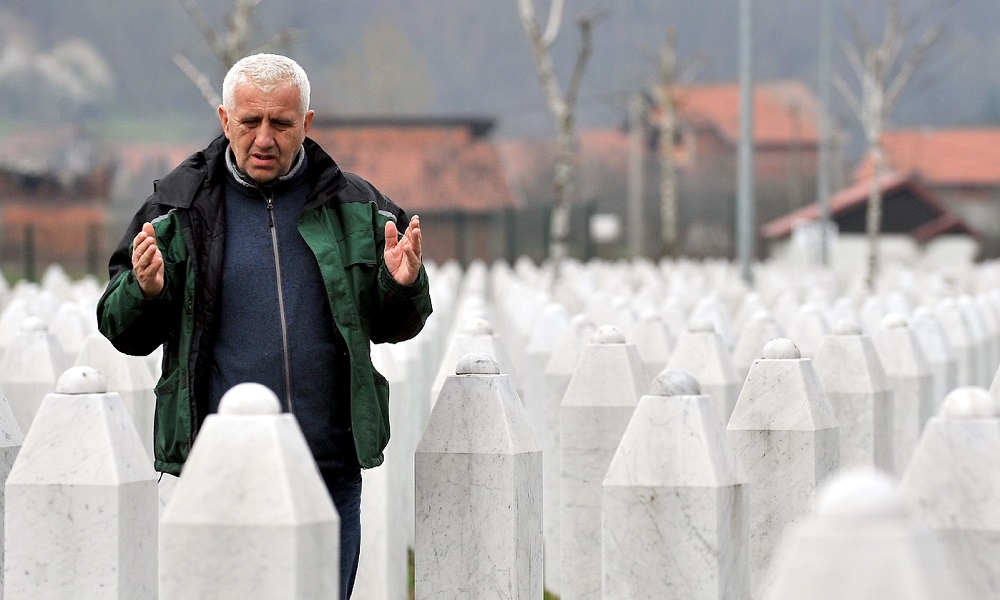A court has ruled that the Netherlands was partially responsible for the deaths of some 300 Muslims at the hands of Bosnian Serb forces in the 1995 after they were expelled from a Dutch UN base.
The ruling by the Hague Appeals Court upholds a 2014 decision that Dutch peace-keepers should have known that the men seeking refuge at the base near Srebrenica would be murdered by Bosnian Serb troops if they were forced to leave — as they were.
States participating in UN peacekeeping missions have rarely faced legal action over their performance.
Some 8,000 Muslim men and boys were killed by Bosnian Serb troops under the command of former General Ratko Mladic at Srebrenica in July 1995, the worst mass killing on European soil since World War Two.
Many of the Muslim victims had fled to the UN-declared “safe zone” in Srebrenica only to find the outnumbered and lightly-armed Dutch troops there unable to defend them. They then headed to the nearby Dutch base.
Reading the complex ruling, Presiding Judge Gepke Dulek-Schermers said that Dutch soldiers “knew or should have known that the men were not only being screened … but were in real danger of being subjected to torture or execution.”
The ruling relates only to the 300 men who had sought safety on the Dutch-controlled base.
In a departure from the earlier ruling, it said the Netherlands should pay only 30 percent of damages, as it estimated the odds at 70 percent that the victims would have been dragged from the base and killed regardless of what the Dutch soldiers did.
The amount of damages is determined in a separate procedure unless the victims and the state can reach a settlement.
Dutch state lawyers left the court building without commenting on the ruling. The Dutch government resigned in 2002 after acknowledging its failure to protect the refugees, though the Netherlands maintains that the Bosnian Serbs, not Dutch troops, bear responsibility for the killings.
Mladic is on trial for genocide with a verdict expected later this year.
The court rejected an appeal from relatives of other Srebrenica victims, who argued the Dutch government should be held responsible for the protection of thousands more Muslims who had gathered outside the base.
“This is a great injustice,” said Munira Subasic of the “Mothers of Srebrenica” group. “The Dutch state should take its responsibility for our victims because they could have kept them all safe on the Dutchbat (Dutch battalions’) compound.”
Lenneke Sprik, an international security lecturer at Amsterdam’s VU University said the ruling was “very important for future peacekeeping missions and the law on state responsibility.” She said the decision might deter countries from contributing peace-keeping troops to future missions.
Lawyer Marco Gerritsen, who represented the relatives, said he understood the relatives’ anger. “But from a legal point of view it is not that bad. Of course we would have hoped for more and I think we had a good case.”
Gerritsen called the court’s assessment of the men’s survival chances “very arbitrary.” He said he will study the judgment to see if it is possible to appeal to the Dutch Supreme Court.
Tuesday’s ruling is the latest in a string of legal case in the Netherlands concerning the country’s role in the Srebrenica massacre and whether the country’s soldiers could or should have done more to prevent the mass killings.
On July 13, 1995, Dutch peacekeepers bowed to pressure from Bosnian Serb forces commanded by Mladic and forced thousands of Muslims out of their fenced-off compound, where they had sought refuge.
The Bosnian Serb forces sorted the Muslims by gender, then trucked the males away and began killing them in what would become the bloody climax to the 1992-95 Bosnian war, a slaughter that international courts have ruled was genocide. The war claimed 100,000 lives in all.
The Srebrenica bodies were plowed into hastily made mass graves, which were later bulldozed and scattered among other burial sites in an attempt to hide the evidence.
Mladic is on trial for genocide and other offenses at a UN tribunal in The Hague for his alleged role in the Srebrenica massacre and other crimes during the war.
